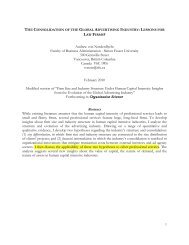Date: April 12, 2013 Topic: The Shrinking ... - Georgetown Law
Date: April 12, 2013 Topic: The Shrinking ... - Georgetown Law
Date: April 12, 2013 Topic: The Shrinking ... - Georgetown Law
Create successful ePaper yourself
Turn your PDF publications into a flip-book with our unique Google optimized e-Paper software.
in the United States and Britain, a result of British colonization.<br />
LPOs started out offering transcription and word processing, and other routine,<br />
back-office paralegal tasks. Over time, they moved to include more substantive issues<br />
such as patent applications and e-discovery. Increasingly, LPOs offer higher-level types<br />
of work traditionally handled by junior associates for a fraction of the price of U.S.<br />
lawyers. If the BPO development is any indicator for the LPO development, this is<br />
unlikely to stop: services offered have become more technical and sophisticated over<br />
time. Harmon understands that the first phase of offshoring involved company-owned<br />
(captive) units where basic and repetitive “back-office” tasks were sent by companies.<br />
During a second phase, non-captive service providers began to emerge, and as more and<br />
more companies set up back offices in India, venture capitalists began to fund start-up<br />
companies to provide similar services to third party clients. 70<br />
While LPOs offer their services to law firms, GCs increasingly buy directly from<br />
LPOs, cutting law firms out. However, while currently few law firms see LPOs as a<br />
threat to the law firm’s core offering, the legal industry would not be the first to<br />
mistakenly dismiss low-end competitors: In <strong>The</strong> Innovator's Dilemma: <strong>The</strong> Revolutionary<br />
Book That Will Change the Way You Do Business Clayton Christensen warns that like<br />
other industries before, incumbent suppliers (such as traditional law firms) run the risk to<br />
be replaced, hurt or significantly changed by low-end competitors (such as LPOs).<br />
“<strong>The</strong> new products were low-end, dumb, shoddy, and in almost every way inferior. But<br />
the new products were usually cheaper and easier to use, and so people or companies who<br />
were not rich or sophisticated enough for the old ones started buying the new ones, and<br />
there were so many more of the regular people than there were of the rich, sophisticated<br />
people that the companies making the new products prospered. Christensen called these<br />
low-end products “disruptive technologies,” because, rather than sustaining technological<br />
progress toward better performance, they disrupted it. After studying a few exceptions to<br />
the pattern of disruption, Christensen concluded that the only way a big company could<br />
avoid being disrupted was to set up a small spinoff company that would function as a<br />
start-up, make the new low-end product, and be independent enough to ignore what<br />
counted as sensible for the mother ship.” 71<br />
This scenario becomes even more palpable since buyers who switch to LPO suppliers<br />
“are unlikely to switch back to <strong>Law</strong> Firms to have that work done in the future,”<br />
according to the 20<strong>12</strong> Legal Outsourcing Market Global Study. 72 Despite the possible<br />
threat, the Study noted that law firms have taken few steps to protect themselves against<br />
their clients’ changing buying pattern. In fact, it remarks that “inaction by <strong>Law</strong> Firms is<br />
one of the biggest threats.” 73<br />
2. Procurement<br />
Collaboration with procurement is a more recent development, taking part in<br />
large corporations, particularly in Fortune 100 companies. Historically, procurement<br />
70 Id.<br />
71 Larissa MacFarquhar, Profiles, “When Giants Fail,” <strong>The</strong> New Yorker, May 14, 20<strong>12</strong>, p. 84<br />
http://www.newyorker.com/reporting/20<strong>12</strong>/05/14/<strong>12</strong>0514fa_fact_macfarquhar#ixzz2McKZaqSd; Clayton Christensen, <strong>The</strong> Innovator's Dilemma:<br />
<strong>The</strong> Revolutionary Book That Will Change the Way You Do Business.<br />
72 See Id. at 2.<br />
73 Id.<br />
13
















